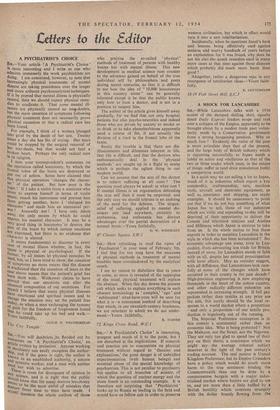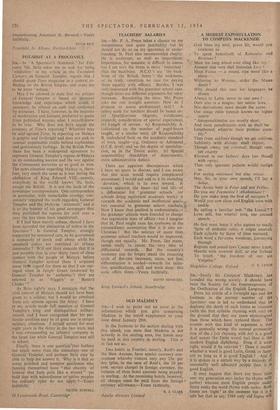A SHOCK FOR LANCASHIRE
Sia,—,While Lancashire talks with a 1930 accent of the dumped shilling shirt, equally dated Daily Express leaders mope and rant over a collapse of the Empire, apparently to be brought about by a modest trade pact volun- tarily made by a Conservative government from a strong bargaining position. Why so much fuss ? Evidently the voice of the past is more articulate than that of the present, and the large body of British industry which is exporting successfully to Japan needs a lobby as active and vociferous as that of the two or three trades which must, in the nature of things, suffer in (and draw stimulation from) a competitive world.
In a quiet way we are selling a lot to Japan, much of it in industries which export a key commodity, craftsmanship; cars, machine tools, aircraft and electronic equipment, as well as insurance and shipping, are ready examples. It should be unnecessary to point out that if we do not buy something of what Japan has to sell, those of our industries which are virile and expanding to-day will be deprived of their opportunity to deliver the Comets and television stations and Austins and Hillmans which Japan is anxious to take from us. Is the whole nation to lose these exports in Order to maintain Lancashire in the style to which she has been accustomed ? No economic advantage can come, even to Lan- cashire, from advocating less trade for Britain instead of more, for Lancashire stands or falls with us all, despite her natural preoccupation with local affairs. May an outsider suggest, with all diffidence, that Lancastrians look care- fully at some of the changes which have occurred in their county in the past decade ? High-precision engineering is now employing thousands in the heart of the cotton country, and other radically different industries are represented in increasing strength. If full pay packets rather than textiles at any price are the aim, this surely should be the local re- sponse to a world market where a proportion —and only a proportion—of our textile pro- duction is hopelessly out of the running.
The, Imperial Preference conception is in this context a sentimental rather than an economic idea. Who is being protected ? Not the Malayan, nor the Swazi, nor the Nigerian. They are only too glad to spend less of their pay on their shirts; a concession which we might say the average colonial subject deserves in the light of the past century's trading account. The real motive is United Kingdom Preference; but its Empire Crusaders have a policy which would do much more harm to the true sentiment binding the Commonwealth than can be done by a commonsense bargain with a major indus- trialised market where buyers are glad to see us, and are more than a little baffled by a British hostility which contrasts strangely with the dollar brandy flowing from the HUGH RICE



































 Previous page
Previous page